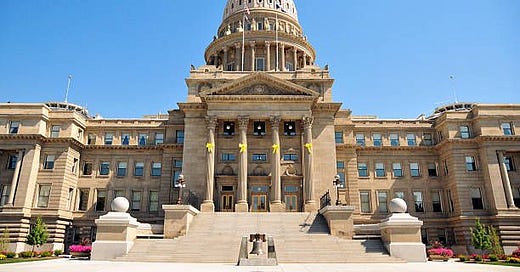I am ok with elected officials from Idaho wanting decisions on marriage to be decided at the State level
The Idaho House called on U.S. Supreme Court to reverse the same-sex marriage ruling from Obergefell v. Hodges (2015)
In the wake of recent legislative actions in Idaho, which you can read about here, there's a compelling conversation to be had about the role of state governments in defining marriage. The Idaho House of Representatives recently passed House Joint Memorial 1, urging the U.S. Supreme Court to reconsider its landmark 2015 decision in Obergefell v. Hodges, which extended the right of marriage to same-sex couples nationwide. This initiative, while symbolic and not legally binding, underscores a significant debate on the balance between federal authority and state rights when it comes to cultural and legal institutions like marriage.
Why the Federal Government should stay out of the bedroom…
Preserving Federalism
The United States was founded on the principle of federalism, a system where power is divided between a central government and constituent political units, like states. Marriage, long considered a matter of state jurisdiction, has historically been regulated by individual states, reflecting their unique cultural, moral, and social landscapes. Allowing states to decide on marriage laws respects this foundational premise. It acknowledges that different states might have different priorities and values, which should be expressed through local governance rather than a one-size-fits-all federal mandate.
Reflecting Local Values
Marriage is inherently tied to cultural, religious, and social norms which vary across the nation. In Idaho, for example, there's a significant portion of the population who supported the 2006 constitutional amendment defining marriage as between one man and one woman. This reflects a community's collective decision on what constitutes marriage within their state. However, in other states like Massachusetts (2003); Connecticut (2008); Iowa, Vermont, New Hampshire, Washington DC (2009); New York (2011); Rhode Island, Delaware, Minnesota (2013); gay marriage was legalized prior to the Supreme Court’s decision.
When the Supreme Court nationalize such definitions, it can override local values, leading to a disconnect between the law and the lived experiences of many citizens. Allowing states to legislate on marriage ensures that laws more closely align with the community's ethos and values.
Encouraging Democratic Dialogue
A state-by-state approach to marriage laws fosters a vibrant democratic process where citizens can engage directly with their representatives on issues that matter deeply to them. This dialogue is essential for democracy; it allows for debates, referendums, and legislative proposals that reflect the current will of the people. When marriage laws are decided at the federal level, the opportunity for this localized democratic engagement diminishes, potentially stifling political discourse and community involvement.
Legal Experimentation and Adaptation
States serve as laboratories of democracy, experimenting with different laws to see what works best for their citizens. If one state's approach to marriage proves successful or problematic, other states can learn from these experiences without the entire nation being bound to follow suit. This adaptability can lead to more tailored solutions that respect both individual rights and community standards.
Respecting the Tenth Amendment
The Tenth Amendment to the U.S. Constitution reserves powers not delegated to the federal government to the states or the people. Marriage, not explicitly granted to federal jurisdiction, should arguably remain a state issue. The push from Elected Officials in Idaho to reconsider Obergefell v. Hodges is a call to respect this constitutional framework, ensuring that states maintain their legislative authority over areas traditionally within their domain.
My unCommon Sense
The debate over whether states should control their marriage laws is not just about same-sex marriage or even abortion; it's about the broader principle of state sovereignty and the right of local communities to shape their legal landscape. While the Respect for Marriage Act provides federal recognition for same-sex marriages, this does not preclude states from setting their own marriage definitions within their boundaries. Idaho's legislative action is a reminder that in a diverse nation, a uniform federal approach to deeply personal and culturally significant issues like marriage might not always serve the best interests of all its citizens.
By allowing states to define marriage, we uphold the essence of federalism, respect the diverse tapestry of American culture, and maintain the democratic process at its most local level. This approach doesn't diminish rights; it enriches the democratic process by allowing each state to reflect its community's values while still acknowledging national standards through federal protections.
As a citizen in a same-sex marriage, I want to know which states are genuinely welcoming for families like mine to live, work, pay taxes, start businesses, and raise children. Although federal law now requires all states to perform same-sex marriages, this doesn't necessarily reflect how welcoming each state is in practice. I need to understand which states are truly "cool with us" beyond just legal obligations and want to reward those states that are using free market principals.
Had the Supreme Court ruled that any marriage performed in any State must be recognized by all States, that would solve the problem.. at least, in My unCommon Sense.
If you want to chat more about this topic with me over coffee or a beer, send me an email dan@thrailkill.us or drop me a message using the button below.
Have a good one,
Dan





